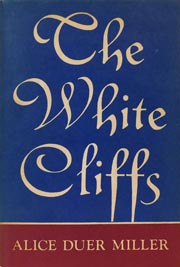
|
Itsas-malda zuriak
LI
Orduan, orduan, Elisabeth’tzaz gogoratu nintzan, Plymouth’ko irian eskillara beera Guda-gizon xoilleri ongi etorria ematera, Aiek bezela — esan oi zun — bera ere “Ingeles utsa”. Ibai-ondo arrutsu ta ur-golko oiantsuetatik Urrutira zijoazen itsas-gizonak, Biurriak, mendegabekoak, ezi-gaitzak, Batzuek itsas-lapurrak, guztiak ausartiak. Beren zoria Ingeleterrakoena zala nabaituaz, Berandu xamar gaizkatzera etorriaz, Egite errezerako beranduegi, Beranduegi, baņan ez geiegi Azken eta okerren erasoa irabazteko.
Hampden’en pentsatu nuen, bera bezelakoak St. John eta Eliot, Cromwell eta Pym, Urte beldurgarri aietan zutik tinko, Amildegia irekitzen, zabaltzen, Erritar eta Erregearen artean; Erritarrak negarrez — negarrez, Rod Beltzak Biltzar-etxeko atean dei egiņaz Ta aurrean biurkeria ikusi — Negarrez, baņan arria bezin gogor, Geroztik — onenean betidanik, berak bakarrik Zekitenak, beste iņork ezin irakatsi, Jainkoaren aotsak esatean: “Jaiki zaitez.”
Bat bateko ero-aldian ez jaiki bear — Ez, arazoa bidezko izan arren, Ez eta ere gorrotoa, urgori turrusta bezela Erri gaņean ixuri arte. Iņor baztertu gabe auzokoen pentsakeretatik. Ingeleterran agindu dutenak ba’dakite Igaro ezin dan marra izugarria Nolakoa dan, alaz ere bizi. Aspaldian Elisabeth’ek bazekian ori, Bere aita bezin zintzoa, maitea, ausartia, Biozdun eta maltzurra, argia, Ezur-mamiraņo ere ingelesa, Aitaren antzera burrukaria. Beren eskubideen alde egiten zuten Ingelesen indarrari, Elisabeth’ek Ez zien beņere jazarketatu.
LI And then, and then, / I thought of Elizabeth stepping down / Over the stones of Plymouth town / To welcome her sailors, common men, / She herself, as she used to say, / Being ‘mere English’ as much as they— / Seafaring men who sailed away / From rocky inlet and wooded bay, // Free men, undisciplined, uncontrol led, / Some of them pirates and all of them bold, / Feeling their fate was England’s fate, / Coming to save it a little late, / Much too late for the easy way, / Much too late, and yet never quite / Too late to win in that last worst fight. // And I thought of Hampden and men like him, / St. John and Eliot, Cromwell and Pym, / Standing firm through the dreadful years, / When the chasm was opening, widening, / Between the Commons and the King; / I thought of the Commons in tears—in tears, / When Black Rod knocked at Parliament’s door, / And they saw Rebellion straight before— / Weeping, and yet as hard as stone, / Knowing what the English have always known / Since then—and perhaps have known alone— / Something that none can teach or tell— / The moment when God’s voice says: ‘Rebel.’ // Not to rise up in sudden gust / Of passion—not, though the cause be just; / Not to submit so long that hate, / Lava torrents break out and spill / Over the land in a fiery spate; / Not to submit for ever, until / The will of the country is one man’s will, / And every soul in the whole land shrinks / From thinking—except as his neighbour thinks. / Men who have governed England know / That dreadful line that they may not pass / And live. Elizabeth long ago / Honoured and loved, and bold as brass, / Daring and subtle, arrogant, clever, / English, too, to her stiff backbone, / Somewhat a bully, like her own / Father—yet even Elizabeth never / Dared to oppose the sullen might / Of the English, standing upon a right.
Itsas-malda zuriak |